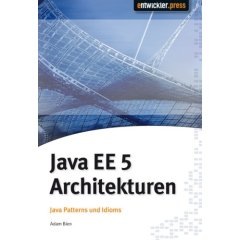
And here it comes: There, at the bottom of their announcement, they reference my blog! I feel honored ...

Long ago, I realized that I am an addict. But recently I had a look at my browser and discovered yet another addiction!
How many times is Google present? I make daily usage of iGoogle, Gmail, Google Calendar, Google Reader, Picasa, Blogger ... at least del.icio.us seems not to be infiltrated yet ...
Recently I seem to notice an increasing popularity of Google Code. More and more projects seem to choose it as host. Guice, Moq, FEST, testngroove, jpboodhoo ... just to name a few.
I exactly remember the first time somebody told me to use Google, and I was like "Gugl? Huh?". This was less than 10 years ago.
Should I be concerned?

 | Why is code generation bad? -Ayende |
This quote is from an interesting thread on Ayendes blog. As usual Ayende is quite provocative by imposing that Microsoft applied the "We'll just code-gen our way out of here!"-Tactic in Linq to SQL.
 |
Models are forever... ...data is a happy side-effect. - David Laribee |
This quote is from a VERY cool and visually polished presentation about Domain Driven Design. Even if it doesn't provide much technical content, the eye-candy is really great...
 | It is always funny to search the web with your own name. There is definitely some strange attraction in the thought of discovering your alter ego, your private Tyler Durden. |
I am quite content with my hits:
My CV on top... ok,
... Patrick will be proud to have his appearance ...
... then some references from groups and schools ...
... well, the badminton-ranking I am really not proud of ...
... then a movie ...
... then ... wait ... a movie? ...
...
OUCH!!!!!!
[I have absolutely nothing to do with this. This is too political incorrect even for my taste, even though not too political incorrect to link it here]
 I blogged about my religion before. As I stated there Christian Bauer, the author of Java Persistence with Hibernate, ranks high on my personal divinity-scale.
I blogged about my religion before. As I stated there Christian Bauer, the author of Java Persistence with Hibernate, ranks high on my personal divinity-scale.
But there are other deities on my IT-Olympus. Near the top, towering Zeus-like above all others, is Eric Evans, the Author of Domain Driven Design. A recent divine manifestation of his presence can be found here.
For years I was living in peace and piety, looking up to my IT-Olympus in awe.
But the time in harmony has abruptly ended now! My religious foundation was put into question! The pillars of my existence began to shake!
Mercy upon our troubled souls: One deity has risen to challenge another!
With a provoking strike the harmony of my IT-Olympus was deliberately demolished:
Repository Pattern vs. Transparent Persistence
[Check out the comments, the war has been enflamed among the minions ... Lo and behold, the paradise is lost!]
There is no universal rule. Programmers need to think, communicate, and learn. That's part of being professional.
- Kent Beck, Implementation Patterns

|
Kiss me Judas by Will Christopher Baer |

|
Clown Girl by Monica Drake |
|
About a Boy by Nick Hornby |
|

|
Java EE 5 Architekturen by Adam Bien |

|
In this presentation Dan North (pioneer of BDD) makes an interesting observation:
How do you know when Domain Driven Design succeeded? |
After TDD, BDD and DDD I am promoting a new style of development: Assumption Driven Development (ADD)
Here is an example how I practice this style in my current project:
BTW: The code was already there, I only added the comments ...
And to be honest, ADD is only the first stage of my plan to revolutionize software development from the ground up. My real goal is to bring awe, humility and worship back into our daily developer lives. The ultimate stage in my ingenious master-plan is PDD: Prayer Driven Development!
In one of the latest DNR-Interviews Venkat Subramanium makes an interesting statement:
I think code-generation is so 20th century! What you want is code-synthesis.
With code-synthesis a method is actually generated in memory on the fly, it is never created on the disk for you to mess with.
With code generation, the minute you generate the code, its like an itch in the back. You want to modify it, you want to scratch it a little bit and then it turns into a sore after a while.
-Venkat Subramanium, DNR 277 [36min 30s]
I think the distinction between code-generation and code-synthesis is very fluent. The C# compiler is basically just a code-generator (it generates IL-code). ASP.Net is also a code generator that generates IL from ASPX-pages (and code-behind).
 In the case of ASP.Net I personally would also talk about code-synthesis, because the generation process is almost completely hidden from the developer and also happens (almost) at run-time and not at compile-time.
In the case of ASP.Net I personally would also talk about code-synthesis, because the generation process is almost completely hidden from the developer and also happens (almost) at run-time and not at compile-time.
This is in contrast to classical code-generation that is promoted by MDA or tools like CodeSmith and MyGeneration ...
Traditional static languages lend themselves to code-generation. Code-synthesis on the fly is a rather complicated endeavor (who does really understand how ASP.Net works under the hood?).
Modern dynamic languages like Ruby or Groovy are much better qualified for code-synthesis. Since they are interpreted, there is a much more powerful runtime to begin with. Furthermore they offer powerful metaprogramming capabilities. This makes dynamic runtime-behavior much more feasible, which in turn is the base for creating DSLs or code-synthesis.
Just to exemplify the consequences of the differences between code-generation and code-synthesis:
Look at the following ActiveRecord model:
class Firm < ActiveRecord::Base has_many :clients has_one :account belongs_to :conglomorate end
And now think about all the lines code that get generated, if you want to realize the same model with a strongly typed DataSet...
 According to this story in 20min, 87% of all employees feel that they are not performing at their best in their current job.
According to this story in 20min, 87% of all employees feel that they are not performing at their best in their current job.
Currently I am one of them!
I think I am stating the obvious, when I say that performance is highly coupled to motivation.
Comparing my current to my last job, I can totally confirm the listed points that are key-enablers for motivation:
In my opinion another point is as important if not more important:
Salary is not a enabler for motivation, even though it can be a preventer.
Since I am currently looking for a new job, my big challenge is to find a way to ensure the above points. Because I remember that it feels good to perform at my best!
After using a black MacBook for several months now, I decided to try and switch completely (bye bye ThinkPad).
Probably this is just a desperate attempt to be as cool as the real gang members (1, 2, 3, 4 ...)
So why do I need a MacBook Pro when I already have a MacBook? The Answer is Screen! For my work-laptop I do need more screen real estate than the 13'' of the MacBook offers. Also the non-glossy and LED backlit (its bright, real bright...) is a plus.
Does it mean I abandon Windows? No, I will run Windows in a Virtual Machine (either VMware Fusion or Parallels). I played around with Visual Studio 2008 in Parallels, and I did not experience any problems. There are some benchmarks here, that confirm this impression.

|
This is my first post with Mars Edit from my MacBook.
I am not that exited about the mac-options I have found for blogging... I have looked at Mars Edit, at ecto and TextMate but none of them has convinced me ... None of them is near as comfortable as Windows Live Writer (which is free by the way!) |
 | From the SQLAlchemy Home Page:
|
Hmm... why do I get the feeling of being in a bad hacker-movie? Probably I should start looking for the TCP-Button now!
Architecture? Sure Architecture! Ok...
I am curious what I get suggested after buying a "King Kong"-DVD. Maybe this?
Question: Whats the average age of a ruby programmer?
It would be much more interesting, if both of them would be over 18 and one of them would be a girl… so they could actualy record the “Conception of JRuby” … but you would have to pay for that kind of content!
I am currently going through several interview-processes. During the last technical interview I realized, that my knowledge of my favorite programming languages is not as profound as I would like it to be. I always dismissed this shortcoming with the excuse, that such "low-level stuff" was not my primary concern. But now I remembered a quote from my German teacher:
Those without sophisticated vocabulary will stay unredeemed!
- Markus Lüdin
Thinking about the truth of this, I set out to learn to express myself: My first stop was the try-catch-playground in C#-world.
| In the sandbox a toddler had built the following: try{ return true; } finally{ return false; } |
 |
I stopped and began to stare ... schizophrenia started to fill my head ... but fortunately my buddy, the C#-Compiler, stepped in and rebuked the toddler: This was not allowed!
But the toddler was not so easily intimidated: He dug and sculpted with his little hands, and as I stayed and watched, schizophrenia slowly crept back into my head:
try { throw new ArgumentException("First Ex!"); } finally { throw new ApplicationException("Second Ex!"); }
 |
A inexplicable urge came over me, and I started to build fervently my own constructs in the sand around those of the toddler: |
[Test] public void First_Exception_Is_Lost() { SchizophreniaTrap trap = new SchizophreniaTrap(); try{ trap.TryFinallyException(); } catch(ArgumentException ex){ Debug.WriteLine("Caught First Ex"); Assert.Fail("Ha! Things dont just disappear!"); } catch(ApplicationException ex){ Debug.WriteLine("Caught Second"); } }
 Oh no! The test passed! I started to scream! The first exception was lost! It had to be there somewhere in the sand! I started digging...
Oh no! The test passed! I started to scream! The first exception was lost! It had to be there somewhere in the sand! I started digging...
The Mythical Man Month is the Bible of Software Engineering, everybody reads it but nobody does anything about it!
- Frederick P. Brooks
 I am going to give a workshop about Object Relational Mapping at the Workshop-Days of the Swiss Open Systems User Group.
I am going to give a workshop about Object Relational Mapping at the Workshop-Days of the Swiss Open Systems User Group.
The workshop will take place at the ETH Zurich, on the morning of September 12.
This is going to be a basic workshop that aims do give an overview and an introduction to the topic of object relational mapping.
I am going to talk a lot about patterns and techniques. I am going to illustrate this theoretical background with concrete examples realized in Java Hibernate and Ruby Active Record, since those are two very popular, yet different ORM-implementations.
The following workshop in the afternoon is going to be all about Hibernate. The lecturer will be Christian Bauer himself (one of the two Hibernate-Gods and author of Java Persistence with Hibernate). I am a bit nervous about that... I mean to set the stage for a god is quite a responsibility ;-)
 As a lecturer I will be allowed to attend other workshops for free. Of course this chance for knowledge-sucking comes close to my notion of paradise!
As a lecturer I will be allowed to attend other workshops for free. Of course this chance for knowledge-sucking comes close to my notion of paradise!
I plan to attend Rund um den Software-Architekten, Hibernate (awe and worship) and Introduction to JBoss Seam (some more awe and worship).
But there is still a lot of work to do until then...
I blogged about Join Tables and Domain Models before, where I showed different ways to deal with 'association-entities' in Ruby and C# 2.0.
Now in C# 3.0, LINQ offers another interesting way to express a domain model.
Assume the following object model:
Article has associated Users through the 'association-entities' Readings. Now LINQ allows us to express this association in another elegant way:
private readonly List<Reading> readings = new List<Reading>(); public IEnumerable<User> Readers { get { return from reading in readings select reading.User; }
}
When I think about LINQ its mostly in the context of querying data, which is usually a common task in the data access layer. There LINQ allows us to specify what part of a domain model should be loaded.
But the above example shows us, that LINQ can be used in other scenarios, even in expressing our domain model itself.
 | Hello, my name is Jonas and I am an addict! I am hooked for several years now. I have not written a single line of code without being on Resharper! If I am put in front of a clean Visual Studio, I am getting nervous: My hands begin to shake, sweat appears on my forehead and I feel the distinct urge to download at least a trial version of Resharper... I admit it: I am an addict! |



|
But it seems that the backlash is now arriving. Are we approaching what Gartner calls "Trough of Disillusionment"? |
On one hand everybody wants to jump on the bandwagon:
On the other hand, there are more and more people voicing their rather critical opinion towards the ruby-hype. Here are two interesting articles I stumbled across lately:
I personally cannot claim, that I have yet fully grasped the implications and consequences of Ruby and dynamic languages in general. I think that Ruby and especially Ruby on Rails brings some fresh air to the 'dusty old' enterprise development, and therefore has a certain pedagogical effect. The biggest value I see there, is the adamant adherence of good design principles like DRY and Convention over Configuration. Another point of value is that successful Ruby projects teach us, that 'lightweight enterprise development' is feasible in reality. But those points are basically language independent. So the insights we gain from the whole ruby-hype can be applied to other environments.
 I don't think Ruby is a silver bullet for enterprise development in general. But when you wholeheartedly embrace it, it could well become your personal silver bullet... |
 It's not the strongest of the species that survives, nor the most intelligent... but those most responsive to change.- Charles Darwin |
| Could it be that someone is doing their homework, and evolution theory is the topic of the next exam? |
Historically, there have been more Microsoft ways to access the Northwind database than there are rows in the Customer table.
- David Ing
(from a funny blog post against the hype of C# 3.0 and Linq/DLinq)
 Call me stupid, but I only recently realized, that the access-level 'protected' has a different meaning in Java than in C#.
Call me stupid, but I only recently realized, that the access-level 'protected' has a different meaning in Java than in C#.
Visibility of the members of Alpha:
| Modifier | Alpha | Beta | AlphaSub | Gamma |
| public | Y | Y | Y | Y |
| protected | Y | Y | Y | N |
| no modifier* | Y | Y | N | N |
| private | Y | N | N | N |
(* also called package private)
Visibility of the members of Alpha:
| Modifier | Alpha | Beta | AlphaSub | Gamma |
| public | Y | Y | Y | Y |
| protected internal | Y | Y | Y | N |
| internal | Y | Y | N | N |
| protected | Y | N | Y | N |
| private * | Y | N | N | N |
(* private is the default access-level for members if nothing is specified)
 From the ASP.NET Scalability Panel (DNR 246):
From the ASP.NET Scalability Panel (DNR 246):
- Kent Alstad (1h 08min 53sec)
![moz-screenshot-11[2][1][1][1]](http://realityloop.net/blog/ReturnoftheFriend_D141/mozscreenshot112111_thumb.jpg) In the good old days, friendship was a meaningful construct.
In the good old days, friendship was a meaningful construct.
On lone evenings, I like to look back to the long gone era of C++, long before the decadence of virtual machines and the sloth of garbage collection.
Back in those days I could declare someone as a friend and this meant trust. Absolute, boundless trust. Even though this intimate relationship was not necessarily bi-directional (I was not necessarily the friend of my friends...sigh!)
I know, its hard to grasp the full meaning and consequences of friendship for the insubordinate youths of today's Java- and C#-Sharp generation (and even more for their self-indulgent Ruby- and Phyton-offspring).
For a long time I had looked at the world of today with great despair, but recently a spark of new hope has found its way into my heart: Friendship has returned with the .NET Framework 2.0 and seeks its way into the troubled lives of the young generations.
Of course today's new friendship is not the same as in the old days: The friendship between assemblies its much more coarse than the delicate friendship between classes used to be. But hey, it's a beginning, don't call me a grumpy old man!
Here we have a modern declaration of friendship:
using System.Runtime.CompilerServices; [assembly: InternalsVisibleTo("Test")] namespace Friends { public class PublicFriend { internal string InternalMethod() { return "I am Internal!"; } } internal class InternalFriend { public string PublicMethod() { return "I am Internal!"; } } } |
And here we have an example of how to enjoy the pleasures of this friendship:
[TestFixture] public class Test { [Test] public void instantiate_internal_friend_should_work() { InternalFriend myFriend = new InternalFriend(); Assert.IsNotNull(myFriend); string test = myFriend.PublicMethod(); Assert.IsTrue(test.Length > 0); } [Test] public void calling_internal_method_should_work() { PublicFriend myFriend = new PublicFriend(); string test = myFriend.InternalMethod(); Assert.IsTrue(test.Length > 0); } } |
Rejoice and praise the lords high up in Redmond for the mercy they show for our blunted souls!